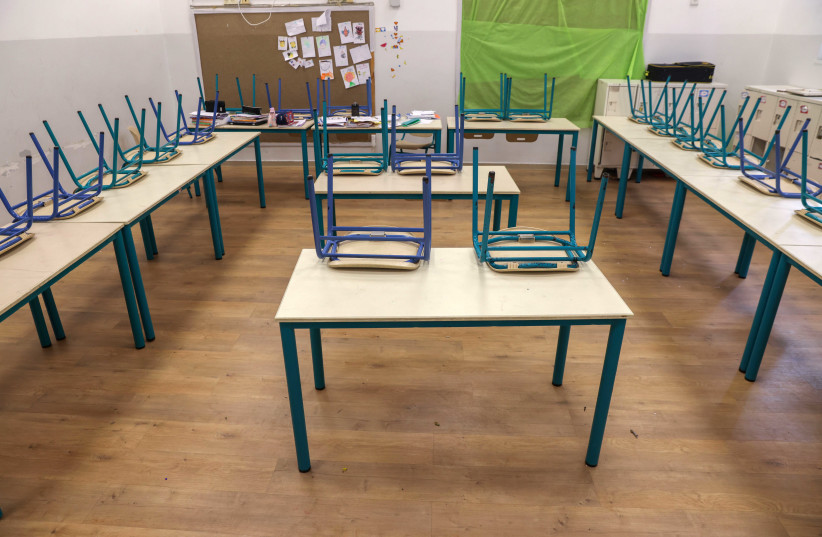As the new school year begins in Israel today in the shadow of yet another narrowly averted strike of high schools, following marathon negotiations between the government and teachers over salaries, one thing must be made clear: Teachers, who have one of the hardest and most important jobs out there, deserve fair and reasonable wages – but children and parents should not be held hostage in salary negotiations until the eleventh hour.
On Wednesday night, representatives of the ministries of Education and Finance and the Secondary School Teachers Association finally agreed on a NIS 2,000 raise for teachers, and other issues were apparently resolved during the day on Thursday.
The Treasury reportedly presented a plan to the Teachers Association that would add extra hours to their workload – 25 hours a week instead of 24 – while reducing individual instruction time by two hours.
Education Minister Yoav Kisch and Teachers Association chairman Ron Erez met again yesterday with the goal of averting a strike by reaching a new collective salary agreement to replace the one that expired in February 2022.
Kisch had acknowledged the justice of the teachers’ demands for higher pay, saying, “Increasing teachers’ salaries is, in my view, a super-important thing and I am a full partner of the teachers’ association in this matter.”

Why are Israel's teachers undervalued and underpaid?
High school teachers in Israel, especially new teachers, have justifiably complained for years that their salaries are too low.
The average starting salary for a high school teacher is under NIS 8,500 a month, well under the national average salary of NIS 13,295, compelling many to take second jobs or tutor on the side to make ends meet.
Given that high school teachers play such a key role in educating and impacting the nation’s younger generation, this reflects poorly on the value our society places on them. As a result of their relatively low salaries, lack of financial benefits, and insufficient vacation days, Israel is not only experiencing a significant shortage in teachers but also congested classrooms of 30 or 40 students.
Erez said the shortage is much more severe than the official figure cited by the Education Ministry – 910 teachers across all schools – saying that high schools alone lack 7,000 teachers.
A veteran negotiator on behalf of the teachers, Erez said that while about 20% of teaching positions are not filled, “many others are teaching subjects they are not approved to teach, and students are being crammed into classrooms to overcome the lack of teachers.”
Ahead of the opening of the new school year, the State Comptroller’s Office issued a statement on Tuesday highlighting the wide gaps – especially in funding and facilities – that still exist between the center of the country and the so-called periphery.
“Equality of opportunity begins with education,” said State Comptroller Matan Englman. “Many of our reports have dealt with the disparities in the allocation of educational resources between the center and the periphery. There must not be some children who are worth more and other children who are worth less.”
Twenty years ago, a task forced established by the government made a well-considered list of recommendations that included a significant increase in teachers’ salaries, the introduction of merit bonuses, and extending school days to 4 p.m., while shortening the school week to five days, Sunday through Thursday, dropping the half-day on Friday.
The recommendations were never implemented and every year sees the same scenario being replayed, with threats of teachers’ strikes until the last day of August. The longest and most damaging school strike, which lasted 64 days, took place in 2007.
Some 218,000 educators teach 2.5 million children at 5,440 schools and 22,050 kindergartens across Israel. Ran Erez is right in declaring that the education system should concern every citizen and parent in Israel – but we should also be concerned about an untenable system in which strikes loom before the opening of every school year and no one knows until the very last minute which schools are opening and which aren’t.
Besides everything else, it leaves families in limbo and conveys the wrong message to the country’s children and teenagers.
